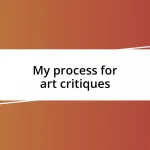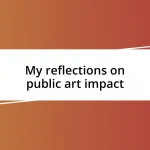Key takeaways:
- Embracing the writing journey involves self-discovery, reflecting on personal motivations, and acknowledging that perfection is less important than progress.
- Identifying personal writing challenges, such as perfectionism and fear of criticism, allows for targeted strategies to improve writing and boost confidence.
- Consistent practice, seeking constructive feedback, and embracing the editing process are crucial steps toward developing a unique writing voice and enhancing writing skills.

Understanding the writing journey
The writing journey is often a winding path, filled with unexpected turns and enlightening discoveries. I remember those early days, filled with frustration as I struggled to find the right words. Was I even capable of expressing my thoughts? It was through countless revisions and moments of doubt that I realized writing wasn’t about perfection but rather about progress.
At times, I found myself reflecting on what truly inspired me to write in the first place. Was it a desire to share my experiences, or was it the need to connect with others? The more I pondered my motivations, the clearer my voice became. Those late nights spent scribbling in my journal became not just a routine but a lifeline, helping me understand my own emotions and thoughts.
Eventually, I learned that writing is a continuous journey of self-discovery. Each piece I created felt like a puzzle, revealing parts of me that I hadn’t fully explored before. It makes me wonder—how often do we overlook the transformative power of our words? Embracing my unique experiences shaped my voice profoundly, turning my writing into a personal narrative that I could proudly share with the world.

Identifying personal writing challenges
Identifying my personal writing challenges required a good deal of introspection. I often found myself grappling with self-doubt, questioning whether my words were worthy of being read. I’d stare at a blank page, feeling the weight of expectations—both my own and those I imagined from others. As I navigated this uncertainty, I noticed recurring patterns in my struggles, which helped me pinpoint specific challenges.
- Perfectionism: I held myself to impossible standards, often stalling my writing process.
- Time Management: Juggling writing with other responsibilities became overwhelming at times.
- Fear of Criticism: The thought of someone judging my words made me hesitant to share my work.
- Voice Clarity: I frequently battled with expressing my thoughts coherently and authentically.
- Finding Inspiration: On many occasions, I felt drained, struggling to tap into what motivated me.
Recognizing these challenges was a pivotal moment for me. Once I named them, it was easier to address each one and devise strategies to overcome them. For instance, setting personal deadlines and seeking feedback became essential tools in my writing toolkit. Understanding these hurdles not only clarified my writing path but also deepened my connection with what I wanted to express.

Exploring different writing styles
Exploring various writing styles was one of the most liberating experiences for me as a writer. I vividly recall the moment I decided to try my hand at different genres. One weekend, I picked up a collection of poetry, something I had never ventured into before. Reading those poems ignited a spark within me that showed me writing could be free and fluid. It was exciting to experiment with imagery and emotion in a way I hadn’t before—this exploration opened a door to new dimensions of my voice.
As I navigated through narrative non-fiction and short story formats, I began to understand the unique rhythm each style demanded. I remember crafting a short story that mirrored my own life’s complexities. The challenge of condensing personal experiences into a compelling narrative taught me clarity and brevity are instrumental. What styles resonate most with you? Perhaps autobiographical writing could reveal your deeper truths, or maybe plays could make your dialogue skills flourish. The key is to believe that every style holds the potential to contribute to your authentic voice.
Experimentation became my ally; it reinforced the idea that there’s no single path to writing. I found joy in how each style allowed me to express different facets of my personality. Freewriting, for instance, became a personal mantra. I often took my morning coffee as an opportunity to scribble down whatever came to mind, ignoring formality. Unstructured writing revealed thoughts I had buried and reinstated my confidence in articulating my feelings. In hindsight, these varied experiences shaped a versatile writer within me—an outcome I never imagined when I began this journey.
| Writing Style | Description |
|---|---|
| Poetry | A condensed form of expression, focusing on emotions and imagery. |
| Narrative Non-Fiction | Real-life stories told with the techniques of fiction, emphasizing personal truth. |
| Short Stories | Brief narratives that usually focus on a single incident or theme. |
| Freewriting | Writing without constraints or expectations to unlock creativity and raw thoughts. |

Practicing writing consistently
Practicing writing consistently was a game changer for me, transforming my whole approach to the craft. At first, I struggled to find the time amidst life’s chaos. However, I made a commitment to myself—I set aside just 15 minutes each day, pencil in hand, and that small commitment blossomed into something profound. I remember one week where words flowed effortlessly, pouring out like a stream after a heavy rain. Those moments reaffirmed my belief in the power of routine.
Reflecting on this practice, I often ask myself: What if I hadn’t made that commitment? The thought is unsettling. I recall a day when I was feeling particularly low; writing became my refuge. I captured my thoughts freely, and it was empowering to see my feelings take shape on the page. Practicing consistently not only sharpened my skills but also became a vital outlet for my emotions. It was through regular writing that I developed resilience, gradually shedding the fear of imperfection.
Additionally, creating a dedicated writing space at home made a significant difference. I remember setting up a small corner with my favorite quotes pinned on the wall—words that inspired me. This familiar environment became a cue for my mind, signaling that it was time to write. Have you created a space that resonates with you? In my experience, such intentional spaces enhance focus and ignite creativity. Consistency paired with environment turned writing from a task into a cherished ritual—a commitment to discovering my true voice.

Seeking constructive feedback
Seeking constructive feedback has been one of the most enlightening journeys of my writing process. I remember the first time I shared a piece I considered my best work, only to receive criticism I hadn’t anticipated. Instead of feeling disheartened, I chose to see it as an opportunity to grow. That helped me realize that feedback is not a reflection of my worth; rather, it’s a lens into how others perceive my ideas, guiding me to refine my voice.
Actively seeking feedback from trusted peers changed my writing landscape. I recall a particular instance where I participated in a writing workshop, surrounded by passionate individuals. The diverse perspectives offered an awakening to blind spots I hadn’t noticed. It struck me how valuable varied viewpoints can be in uncovering layers to my writing. Isn’t it fascinating that sometimes, it takes another person’s insight to shed light on what we thought was already clear?
Feedback is a collaboration, a dance between the writer and reader. I learned to ask specific questions about my work, such as whether the emotions I intended to convey actually resonated. This approach transformed my feedback sessions from passive exchanges to rich dialogues. It fostered a sense of openness that invited constructive criticism rather than defensive reactions. Ultimately, embracing feedback has not only strengthened my writing but opened doors to deeper connections with others about my stories.

Finding inspiration in every experience
Finding inspiration in every experience has been a fascinating journey for me. I often reflect on a mundane grocery trip that unexpectedly turned into a creative spark. As I wandered through the aisles, I overheard a conversation between two strangers debating the best type of olive oil. Their passion and enthusiasm were contagious, igniting a fire in my mind that compelled me to explore everyday interactions. Have you ever noticed how snippets of life can weave their way into your writing?
Sometimes, I find inspiration in the quiet moments that might seem inconsequential. I remember one peaceful afternoon, sitting on my porch, sipping tea while watching the world go by. A young child chasing after a butterfly captured my attention. The simplicity of that scene prompted me to reflect on innocence and wonder, revealing layers of emotion that I hadn’t considered before. Have you thought about what small moments inspire you?
When I look back on my experiences, it’s clear that even the challenging ones bear seeds of inspiration. I recall a particularly tough breakup that left me feeling adrift. In the weeks that followed, I began pouring my heart into my journal, transforming my pain into poetry. It struck me how powerful it is to channel difficult emotions into creativity. Haven’t we all found strength in vulnerability? By embracing every experience—good or bad—I’ve learned that the world is a never-ending source of inspiration, waiting to be discovered through our unique lenses.

Embracing the editing process
Embracing the editing process has been something of a revelation for me over the years. Initially, I dreaded the red pen, thinking it indicated failure. However, I learned to view edits as a chance to elevate my work. It’s like sculpting; you chisel away the rough edges to reveal the masterpiece hidden within. Don’t you find that perspective shift makes a huge difference in how you tackle revisions?
One memorable editing session left a lasting impression on me. I was revising a story I believed was nearly perfect, only to discover that several key sections felt disjointed upon rereading. As I made my notes, I felt a wave of frustration wash over me. Yet, when I began cutting and restructuring, I uncovered deeper themes that enhanced my narrative. This taught me that the act of editing isn’t merely correcting mistakes; it can lead to profound revelations about my writing.
I also learned that sharing my draft with a trusted mentor opened my eyes to various angles I hadn’t considered. Their feedback made me realize that sometimes, you need another set of eyes to see what’s missing. I even found it quite liberating to let go of sentences I once thought were essential. How freeing is it to understand that trimming your work can actually sharpen your voice? Each edit is an opportunity to refine what I want to say, helping me craft my message with clarity and passion.














